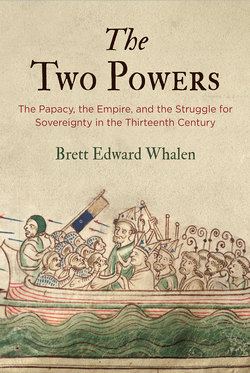The Two Powers

Реклама. ООО «ЛитРес», ИНН: 7719571260.
Оглавление
Brett Edward Whalen. The Two Powers
Отрывок из книги
The Two Powers
Ruth Mazo Karras, Series Editor
.....
Gerold likewise portrayed Frederick’s ten-year truce with al-Kamil as unrealistic, unsustainable, and a danger to the Christian presence in the Holy Land. He forwarded to the pope a French transcript of the pact that had been sent to him by Hermann of Salza, master general of the Teutonic Order, adding his own derisive commentary on its terms in Latin.43 According to Gerold, the emperor gave away everything and got little in return. He even surrendered his breastplate, shield, and sword to the sultan, telling him that he never wished to take up arms against him again. Gerold stressed the “secretive” and “fraudulent” nature of the negotiations, as Frederick finally made his “hidden” plans “public,” having agreed to the terms of the treaty without ever having them “read aloud or recited openly” before his fellow crusaders, thereby denying the bishops and members of the military orders accompanying the army a chance to consult with the Latin patriarch before they agreed to anything—hardly the behavior of a Christian prince and crusader.44 Possession of the Temple Mount, including the Temple of the Lord, as the crusaders called the Dome of the Rock, was an especially sensitive point. Gerold highlighted the treaty’s clause allowing the infidels continued access to the holy site. With “a greater multitude of Saracens coming to pray at the temple than the crowds of Christians coming to the sepulcher,” he wondered, “how will the Christians be able to maintain their dominion for ten years, without discord and danger to their persons?”45 The “clamor” of Saracens’ call to prayer, proclaimed from that high place above the city, caused all sorts of confusion and uncertainty among the crusaders.46
With regard to the Temple Mount, Frederick seemed to realize that he possibly had a possible public relations disaster on his hands. In his letter Letentur et exultent, which celebrated his triumphs in the holy places, he carefully explained that the Saracens would enter the site “in the manner of pilgrims,” unarmed and unable to spend the night, praying and departing. Apologizing for these upsetting sights and sounds, Hermann of Salza likewise stressed that Christians would also have free access to pray at the site, that the Saracens could keep only a few “unarmed, elderly priests” at the temple, and that the emperor’s guards would monitor the gates into the site, deciding who could enter and exit. He even pointed out that the infidels allowed the Christians similar rights of worship in the cities under their control.47
.....